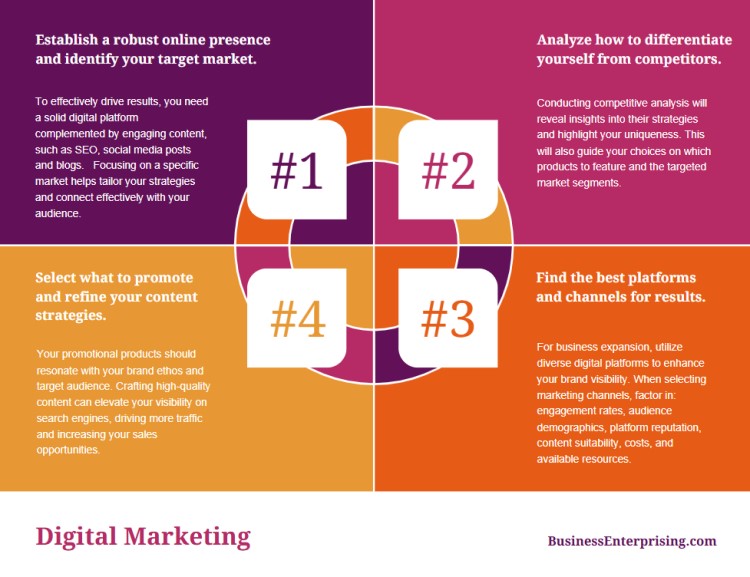
Your marketing efforts should begin with understanding your audience and delivering personalized messages. For instance, addressing their needs makes campaigns more engaging and impactful. Additionally, combining traditional and digital channels allows you to extend your reach and adapt to changing trends.
A well-executed marketing plan supports long-term business goals. For example, leveraging data, refining campaigns, and maintaining consistency all maximize your impact. Ultimately, marketing provides a robust framework to grow your business and build meaningful customer relationships.
Developing a Target Audience Profile
Developing a target audience profile is an essential step in marketing for business growth. When you understand your ideal customers, you create campaigns that resonate and deliver results. Furthermore, focusing on their preferences allows you to refine your strategies and enhance your impact.
Begin by researching your market to identify customer traits. Demographics like age, location, and income offer key insights into who your audience is. However, psychographics—such as interests and values—provide an even deeper understanding. Combining these elements helps create a detailed profile that guides your marketing.
Talking to potential customers can also provide valuable information. For example, conducting surveys or reading reviews reveals what motivates their choices. As a result, you can tailor your messaging to address their priorities and pain points, which strengthens your connection with them.
Data and analytics tools further refine your understanding. Platforms like Google Analytics help track audience engagement and highlight patterns. By analyzing this data, you identify effective strategies and pinpoint areas for improvement.
A clear audience profile ensures you focus your resources on what matters most. Knowing your customers allows you to create efficient, impactful marketing efforts that attract new audiences and build trust over time.
Leveraging Digital Marketing Channels
Leveraging digital marketing channels is an effective way to drive results in marketing for business growth. Social media, email marketing, content marketing, and SEO each bring unique advantages. Furthermore, combining these strategies helps you engage your audience across multiple platforms.
Social media connects you directly with customers and keeps them informed about your business. For example, platforms like Instagram, Facebook, and LinkedIn let you showcase products, share updates, and engage followers. Regular posting and responding to comments build loyalty and trust.
Email marketing ensures consistent communication with your audience. Sending personalized updates, promotions, and newsletters keeps your brand top of mind. Additionally, automation tools help segment your audience and tailor messages, increasing conversion rates.
Content marketing adds value and attracts new customers. For instance, blogs, videos, or infographics that address common questions establish your authority. Sharing informative content also boosts SEO, driving organic traffic to your website.
Digital marketing channels are most effective when used together. By integrating social media, email, content marketing, and SEO, you create a comprehensive strategy. This multi-channel approach expands your reach and supports long-term growth.
Building a Strong Brand Identity
Building a strong brand identity is fundamental to marketing for business growth. A clear, consistent brand helps you establish trust and recognition. Additionally, every element of your brand—from visuals to tone—should align with your mission and values.
Consistency in messaging ensures your audience understands who you are and what you offer. For instance, your tagline, social posts, and ads should reflect the same purpose and values. This approach builds familiarity and creates reliability for your customers.
Visual elements play an equally important role. Your logo, colors, and design style should remain uniform across all platforms. Whether someone visits your website or sees an ad, they should immediately recognize your business. Consistent visuals make your brand more professional and memorable.
Tone also influences how you connect with your audience. For example, whether you choose a formal or conversational style, maintaining it across communications fosters familiarity and engagement. Cohesion in tone strengthens your brand identity and ensures customer loyalty.
A strong brand identity fosters trust and recognition, which are essential for long-term success. By maintaining consistency across messaging, visuals, and tone, you enhance your marketing’s effectiveness and build a reliable image that supports growth.
The Role of Data and Analytics in Marketing
Data and analytics are essential to marketing for business growth. Tracking key performance metrics provides insights into your campaigns’ effectiveness. Consequently, refining strategies and optimizing spending becomes more achievable.
Start by identifying metrics that align with your goals. For example, tracking website traffic and social media engagement reveals how your audience interacts with your content. Analyzing this data helps you pinpoint successful strategies and identify areas for improvement.
With data, you can make real-time adjustments to campaigns. For instance, if an ad underperforms, reallocating funds to a higher-performing one increases efficiency. Tracking conversion rates also highlights the most impactful platforms and messages.
Regularly reviewing analytics uncovers trends over time. This information allows you to anticipate customer behavior and plan future campaigns. Staying data-driven ensures your business adapts quickly to market changes.
By incorporating analytics into your marketing, you strengthen your strategy and maximize your impact. Data-driven decisions directly align your efforts with business growth goals.
Personalized Marketing and Customer Engagement
Personalized marketing is key to marketing for business growth. Tailored messages improve customer experiences, build loyalty, and increase sales. Moreover, understanding your audience on a deeper level fosters meaningful connections and long-term success.
Collecting customer data through CRM tools or analytics platforms provides valuable insights. For example, tracking purchase history or behavior helps segment your audience. By grouping customers based on preferences, you can deliver highly relevant campaigns.
Personalization also enhances customer interactions. For instance, product recommendations based on past purchases make your communications more engaging. Using a customer’s name or offering birthday discounts further personalizes their experience.
Engagement goes beyond transactions. Encouraging two-way communication through feedback, comments, or helpful content builds trust. Engaged customers are more likely to remain loyal and recommend your business to others.
By focusing on personalized marketing and engagement, you build strong relationships and boost sales. This approach ensures your marketing directly contributes to growth.
Creating Scalable Marketing Strategies
Scalable strategies are crucial for marketing for business growth. These tactics grow alongside your business and help expand into new markets efficiently.
Focus on adaptable methods like digital marketing. Social media, email, and content marketing allow you to adjust budgets, refine targeting, and explore new audiences. This flexibility supports growth without overextending your resources.
Automation tools streamline your efforts as your audience grows. For example, email platforms enable segmentation and scheduling, while social media tools simplify posting. Automating repetitive tasks ensures consistency and saves time.
Expanding into new markets requires careful research. Tailoring campaigns to local needs based on data-driven insights helps you connect with broader audiences. Revisiting strategies regularly keeps them aligned with growth goals.
Scalable marketing ensures flexibility and control as your business evolves. By leveraging adaptable tools and techniques, you effectively manage growth and maintain engagement. This approach directly supports long-term success.
Conclusion
Marketing for business growth requires thoughtful strategies and consistent effort. By understanding your audience and leveraging digital channels, you can build effective campaigns. Personalizing your messages and using data to refine your approach ensures your efforts align with your goals.
As your business grows, scalable strategies allow you to expand without overstretching your resources. Automation tools, analytics, and adaptable tactics make it easier to reach new audiences while maintaining efficiency. Regularly reviewing your progress helps you stay responsive to changes in the market.
With a clear plan and the right tools, your marketing can drive meaningful results. By focusing on growth-oriented strategies, you create opportunities to build lasting customer relationships and achieve long-term success.



